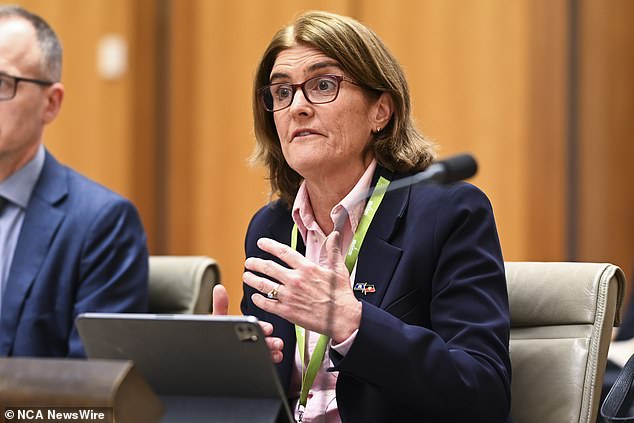RBA governor issues interest rate rise warning for Australians with a mortgage
A former top official at the Reserve Bank is now predicting a rate hike on Melbourne Cup Day after her former boss Michele Bullock hinted at a tougher approach to inflation.
Until last month, Luci Ellis was assistant governor of the RBA and responsible for economic policy.
Westpac’s new chief economist, who first joined the Reserve Bank in 1991, is now predicting a rate hike on November 7.
“We felt that it would take a significant upside surprise to get the RBA board to raise rates at the November meeting,” Ms Ellis said.
“So yeah, I’ve seen enough to predict my first-ever rate hike.”
Ms Ellis on Thursday joined the Commonwealth Bank, ANZ and NAB in predicting a rate hike on Melbourne Cup Day – a day after quarterly inflation data showed the consumer price index rose 5.4 per cent in the year to September.
Luci Ellis was until last month an assistant governor of the RBA, responsible for economic policy (she is pictured left in 2020 with former Reserve Bank governor Philip Lowe)
This was only marginally below June’s 6 percent level, which frustrates the Reserve Bank as it has raised rates 12 times since May 2022.
Ms Ellis said the quarter-on-quarter or three-month CPI increase of 1.2 per cent was too high for the RBA’s liking.
“A difference of 0.1 percent may not seem like much, but the underlying details were sobering,” she said.
Ms. Bullock, who took over as governor last month, told a Senate committee on Thursday that she would raise rates if there were signs that inflation would not return to the top of the two to three percent target range until after June 2025.
‘We have made that very clear. Even though we haven’t raised rates since our last rate hike in June, we’ve made it very clear that we may have to go again.”
“We’re looking at some of the more persistent parts of inflation (and) asking, ‘Are there any signs that this could ease in the future?’ she said.
The minutes of the RBA’s October meeting, where she was in charge for the first time, suggested there would be a ‘low tolerance’ if inflation remained higher for longer, arguing that consumers would remain much spending if they expected prices to remain high.
“All I was really trying to convey was the same thing we’ve been making clear all along, which is that the longer inflation stays outside the target range, the more likely inflation expectations are to adjust accordingly,” Ms. Bullock said.
“You’re right, the forecasts have shifted, but we have assessed that on balance we think we can succeed in restarting the economy, slowing down the economy sufficiently without actually pushing it into a recession and an unnecessary increase in the unemployment.
“If we can do it in that time frame, we think we can get it back and we can maintain inflation expectations.
“When I say ‘low tolerance,’ we’ve always said we have low tolerance. I don’t think I said anything new there.’

Michele Bullock, who took over as governor last month, told a Senate committee on Thursday that she would raise rates if there were signs that inflation would not return to the top of the two to three percent target range until after June 2025.
The Reserve Bank raised interest rates to 18 percent in 1989, which led to a recession in early 1991.
A rate hike in November would be the 13th in 18 months, contributing to the most aggressive pace of monetary policy tightening since 1989, with monthly mortgage payments rising 63 percent.
A borrower with an average mortgage of $600,000 will be able to withstand a $99 increase if interest rates rise by a quarter of a percentage point next month.
The conflict between Israel and Hamas is raising concerns about petrol prices, with monthly inflation data from the Australian Bureau of Statistics showing a 19.7 percent increase in the year to September.
This predated the terrorist group Hamas invading Israel on October 7.
“The last conflict has also led to problems,” Ms Bullock said.
